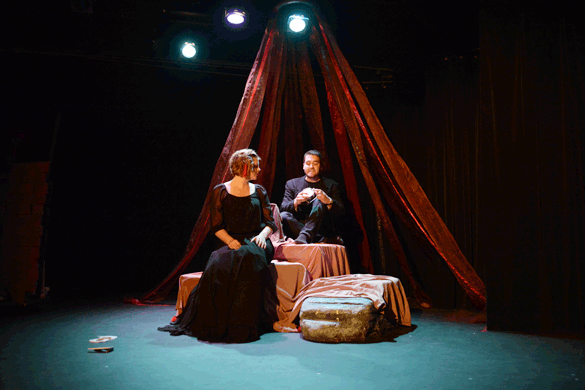Kleinau uses real life experiences as inspiration

February 24, 2015
Creative writing professors constantly teach students to write what they know. Four Marion Kleinau Theater performers are taking this advice to heart.
The theater is presenting a double bill performance on Thursday, Friday and Saturday. The two shows are “Under the Mantle,” written by Meggie Mapes and Mike Selck and directed by Benny Lemaster, and “Astigmathesim,” written and compiled by Angela Glunz and directed by her and Stephenie DeArcangelis.
Glunz, a doctoral candidate in performance studies from Minnesota, said “Astigmathesim” is about her experiences in a religious family, and involves imaginary scenarios of her telling her family she does not believe in God.
Advertisement
“Religion is so prevalent in everyday life,” she said. “Even me, as an atheist, I am still surrounded by religious people, religious families, religious culture; the world is religious.”
Glunz said she adapted pieces for the play from other works involving common themes of religion and religious persecution. Julia Sweeny’s documentary “Letting God Go” and Ayaan Hirsi Ali’s “Infidel” are two of the adapted works.
DeArcangelis, a doctoral candidate in performance studies from Crete, said the show questions the role of organized religion and how it shapes people’s role in society.
“It is not only about church, but the men who run it and where you place in the hierarchy,” she said.
Glunz and DeArcangelis agreed that there are a lot of emotions involved with religion, but many of topics are dealt with humorously. DeArcangelis said humor is used to rebel against the sensitive topic of religion in a respectful manner.
“Some of the things Angie has done and talks about in the show are the funniest things I have ever seen,” she said.
For “Under the Mantle,” humor does not figure as prominently.
Advertisement*
Mapes is one half of the writing team in “Under the Mantle” and said she and Selck used their experiences as a couple of three years, in the story.
The show is about disability and gender inequality. It is told from a pessimistic viewpoint, commenting on how optimistic philosophies are used against gender and those with disabilities, she said.
Mapes, a graduate student in communication from Iowa, said the most obvious example of this is how people claim to be in a “post-feminist” age, claiming there are not inequalities between genders and ignoring clear imbalances.
“We try to pretend sexism is this thing we have progressed so far from,” she said. “Because women can vote, it is now ok to comment on their bodies.”
Selck, a graduate student in communication from Kansas City, Mo., said “Under the Mantle” is about the unrealistic communications of identity politics and how people discuss disability and sexism. It disrupts the concept of narrative and idealistic language people use to talk about issues.
“What we are talking about are world shifts,” he said. “Thinking about the same phenomena from two different viewpoints.”
The story is an unconventional love story, Selck said, critiquing optimism and merging the idea with pessimism and feminism.
The pessimistic viewpoint means the play is looking at realistic avenues to happiness, Mapes said, rather than being unhappy in nature.
The show has three different endings; each night will have a unique way of closing out and will run the opposite of the night before, he said.
“We went into this knowing there was no way we were going to deliver the exact same pristine little package every night,” he said. “So why even try?”
This is how pessimism works, Mapes said. The way characters interact is different, so we approach the text in three different ways, she said.
The double bill will start at 8 p.m. and prices are $5 for students with ID and $7 for general admission. Both shows contain mature themes.
Advertisement






